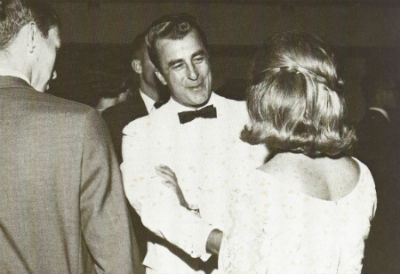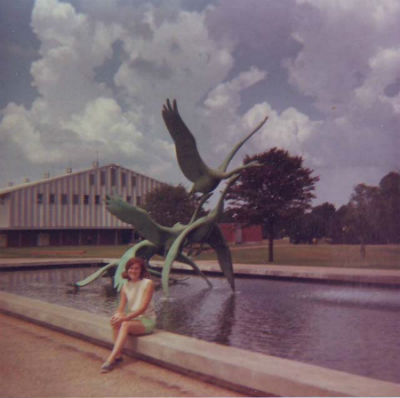Leslie L. McCullough – ‘A Manager’s Manager’
By Neil Earle
 Mr. McCullough welcomes students, 1970.
Mr. McCullough welcomes students, 1970.Leslie L. McCullough passed away on March 11, 2019 in Gladewater, Texas. He was 89 years old. He spent his first six years in Nebraska (“I’m a flatlander,” he once said) and then moved to Hillsboro, Oregon in 1935. He met his wife Marian in Oregon and they were married in 1952.
It was his capable gregarious wife who first introduced him to the expanding media ministry of the Radio (later Worldwide) Church of God, as it was then known. Mr. McCullough had been drawn to a business career – as a manager trainee for S.H. Kress and later for Sears – but after initial disinterest something about the radio personalities of Herbert W. and Garner Ted Armstrong drew his attention. (See Amazon for my own early overview of the developing movement titled “The Exocentric Sectarian.”)
Though money was scarce Les and his wife moved to the church’s Ambassador College in 1957 (where money was often scarcer!) and was spotted by church executives as a welcome addition to the ranks. Even in his first year he was assigned the job of a purchasing manager. His steadiness of performance, his ability to zero in on what was important brought him to the first peak of his career as Deputy Chancellor of a new Ambassador campus at Big Sandy, Texas from 1965 to 1973.
 Big Sandy Field House, 1971.
Big Sandy Field House, 1971.He showed a talent for helping design functional buildings to meet the demands of the growing school. Thousands of young men and women from all across the United States and Canada would come under the McCullough’s wise and steady oversight. They were both unpretentious, quietly charismatic people in their own right and the Big Sandy campus was often a breath of fresh air in the turbulent ups and downs of the College and its sponsor, Worldwide Church of God (WCG).
I had often heard of “Mr. Mac’s” steadying reputation and came under his supervision for the fist time when he was made International Director of the corporation in 1973. In June 1978 Mr. Mac, as we called him, took over the Canadian operation where I saw close-up his reputation for administrative savvy. The 1970s were times of turmoil for small conservative churches but Leslie McCullough tried to chart an even course, not making a big fuss over the long hair and extreme music that marked the era. “This too shall pass” seemed to be one of his mantras.
His ability to accommodate people made evident his assignments to oversee the churches in South Africa and later the United Kingdom. Around 1996 he felt he could not support the extraordinary doctrinal changes the WCG was making and he ended his career as President of a WCG offshoot. (For more on that consult Joseph Tkach’s monograph, Transformed by Truth.)
I remember him as an impressive presence with a reputation as a hunter and an outdoorsman but who carried himself modestly. He was easy to underestimate, perhaps, but many found him a piercingly astute sizer-up of people and their strengths. He was also very tolerant on individual personality traits. One of his subordinates – a sharp but pesky outspoken Australian – asked him once: “Do I frustrate you, Mr. Mccullough?” “Why, yes,” came the honest but kindly reply. His subordinate shared that incident at a minsiterial conference as an example of how we should value people for their merits and try to overlook their demerits.
Mr. McCullough was valued as a troubleshooter and exerting a “steady hand on the tiller” in Canada from 1978 to 1980 as another of his assistants stated at a public tribute. In the turbulent history of the WCG that was a trait often in short supply as the fast-expanding sect often made hasty decisions “on the fly” with more than its share of careerists and apple polishers. But Leslie McCullough’s career – like many of his peers – was evidence of the managerial talent that operated just below the surface in the WCG during his time, an always unreported aspect of the invisible props undergirding the sometimes mercurial and unpredictable style of Hebert Armstrong.
I viewed Mr. McCullough as a good boss who tried to keep the Big Picture on things in mind, never flying off in tangents or extremes. There were times he clearly helped us all weather the storm and for that I remain thankful for his guidance.